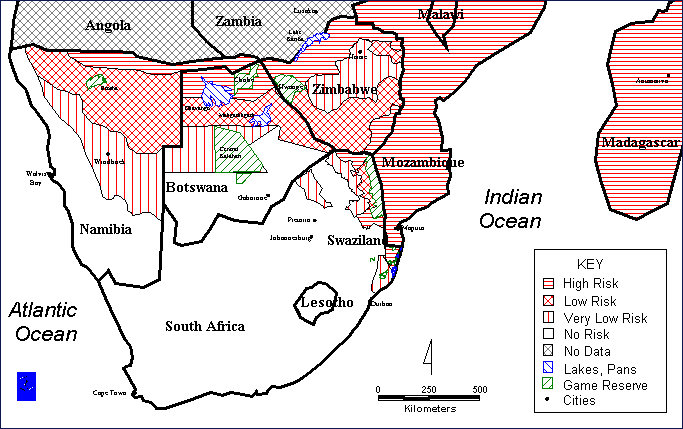Malaria is endemic to all the southern African countries, with the exception of Lesotho, and are not exempt from the potential ravages of the disease with its debilitating effects on communities and development.
Malaria directly affects economic growth and this was clearly shown by the gross national product being the lowest in countries without malaria control programmes (Wernsdorfer and Wernsdorfer 1988).
Conceptual map of malaria risk in Southern Africa

There are a number of constraints on malaria control and a number of factors exacerbating disease transmission in the region. These include:
- Drug resistance
- Insecticide Resistance
- HIV/AIDS
- Population Movement
Unemployment rate and approximate per capita income in 1996 in the 3 malarious provinces and the two magisterial districts of highest risk in each province
| |
% unemployment |
Per capita income |
| KwaZulu-Natal |
39.1 |
1170 |
| Ingwavuma |
63.2 |
390 |
| Ubombo |
57.6 |
560 |
| Mpumalanga |
32.9 |
1050 |
| Nkomazi |
45.3 |
580 |
| Pilgrims Rest |
20.1 |
910 |
| Northern Province |
46.0 |
780 |
| Mutali |
68.6 |
500 |
| Lulekani |
49.0 |
630 |
Malaria is best viewed as a regional as apposed to a country specific problem
Regional collaboration in regard to strategies for malaria control are under discussion by the SADC health desk.
A regional project The Lubombo Spatial Development Initiative (LSDI), is aimed at accelerated development of the North-Eastern region of KwaZulu-Natal, southern Mozambique and eastern Swaziland
South Africa: Local malaria incidence per thousand population: 1998/1999
Swaziland: Malaria incidence per thousand population: 1996
Mozambique: SDI Zone One Baseline Study: Plasmodium Falciparum
infection in children aged 2-15 years

Recommendations
- Ongoing sentinel surveillance network to monitor both drug and insecticide resistance for evidence-based policy decision making;
- Ongoing development of a Malaria Information System (MIS) to allow effective and appropriated data flow to the control departments and the tourism and public sectors;
- Research into the effects of malaria on development of communities, business, industry and tourism;
- Research into the long-term benefit and sustainability of insecticide treated bed nets in terms of efficiency and community acceptance;
|






